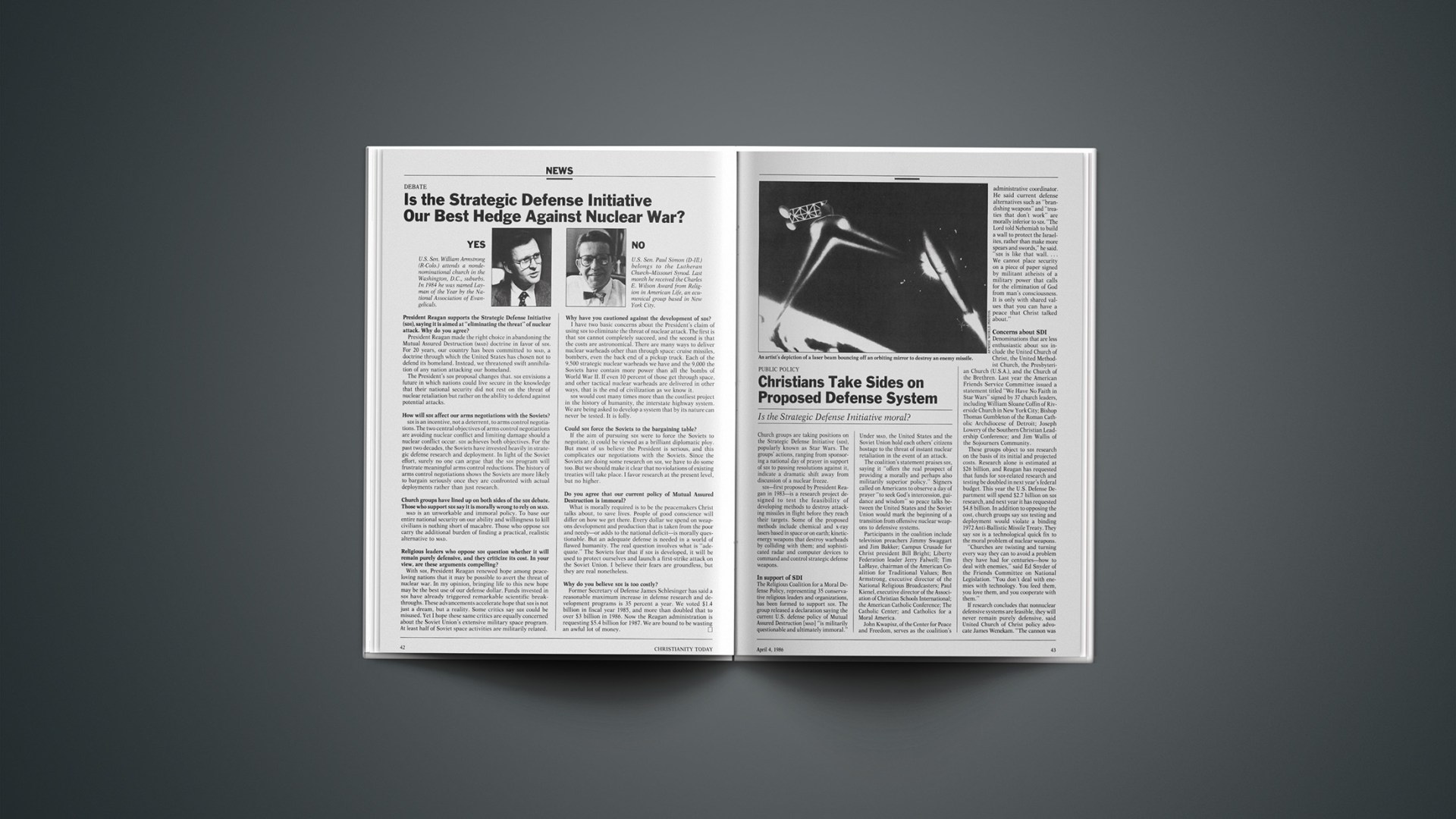Is the Strategic Defense Initiative moral?
Church groups are taking positions on the Strategic Defense Initiative (SDI), popularly known as Star Wars. The groups’ actions, ranging from sponsoring a national day of prayer in support of SDI to passing resolutions against it, indicate a dramatic shift away from discussion of a nuclear freeze.
SDI—first proposed by President Reagan in 1983—is a research project designed to test the feasibility of developing methods to destroy attacking missiles in flight before they reach their targets. Some of the proposed methods include chemical and x-ray lasers based in space or on earth; kinetic-energy weapons that destroy warheads by colliding with them; and sophisticated radar and computer devices to command and control strategic defense weapons.
In Support Of Sdi
The Religious Coalition for a Moral Defense Policy, representing 35 conservative religious leaders and organizations, has been formed to support SDI. The group released a declaration saying the current U.S. defense policy of Mutual Assured Destruction [MAD] “is militarily questionable and ultimately immoral.” Under MAD, the United States and the Soviet Union hold each others’ citizens hostage to the threat of instant nuclear retaliation in the event of an attack.
The coalition’s statement praises SDI, saying it “offers the real prospect of providing a morally and perhaps also militarily superior policy.” Signers called on Americans to observe a day of prayer “to seek God’s intercession, guidance and wisdom” so peace talks between the United States and the Soviet Union would mark the beginning of a transition from offensive nuclear weapons to defensive systems.
Participants in the coalition include television preachers Jimmy Swaggart and Jim Bakker; Campus Crusade for Christ president Bill Bright; Liberty Federation leader Jerry Falwell; Tim LaHaye, chairman of the American Coalition for Traditional Values; Ben Armstrong, executive director of the National Religious Broadcasters; Paul Kienel, executive director of the Association of Christian Schools International; the American Catholic Conference; The Catholic Center; and Catholics for a Moral America.
John Kwapisz, of the Center for Peace and Freedom, serves as the coalition’s administrative coordinator. He said current defense alternatives such as “brandishing weapons” and “treaties that don’t work” are morally inferior to SDI. “The Lord told Nehemiah to build a wall to protect the Israelites, rather than make more spears and swords,” he said. “SDI is like that wall.… We cannot place security on a piece of paper signed by militant atheists of a military power that calls for the elimination of God from man’s consciousness. It is only with shared values that you can have a peace that Christ talked about.”
Concerns About Sdi
Denominations that are less enthusiastic about SDI include the United Church of Christ, the United Methodist Church, the Presbyterian Church (U.S.A.), and the Church of the Brethren. Last year the American Friends Service Committee issued a statement titled “We Have No Faith in Star Wars” signed by 37 church leaders, including William Sloane Coffin of Riverside Church in New York City; Bishop Thomas Gumbleton of the Roman Catholic Archdiocese of Detroit; Joseph Lowery of the Southern Christian Leadership Conference; and Jim Wallis of the Sojourners Community.
These groups object to SDI research on the basis of its initial and projected costs. Research alone is estimated at $26 billion, and Reagan has requested that funds for SDI-related research and testing be doubled in next year’s federal budget. This year the U.S. Defense Department will spend $2.7 billion on SDI research, and next year it has requested $4.8 billion. In addition to opposing the cost, church groups say SDI testing and deployment would violate a binding 1972 Anti-Ballistic Missile Treaty. They say SDI is a technological quick fix to the moral problem of nuclear weapons.
“Churches are twisting and turning every way they can to avoid a problem they have had for centuries—how to deal with enemies,” said Ed Snyder of the Friends Committee on National Legislation. “You don’t deal with enemies with technology. You feed them, you love them, and you cooperate with them.”
If research concludes that nonnuclear defensive systems are feasible, they will never remain purely defensive, said United Church of Christ policy advocate James Wenekam. “The cannon was invented as an offensive weapon; armor was invented to defend against attack,” he said. “But when you put the two together, you have a tank, which is an attack vehicle. Likewise, when you put defensive weapons together with offensive weapons, you have something like a sophisticated tank—it can be used to attack.”
U.S. Sen. Sam Nunn (D-Ga.), the Senate’s leading expert on military affairs, has warned that the Reagan administration may be pursuing a dangerous policy by overselling SDI as a means of shielding masses of people from nuclear eradication. In a Cox News Service interview Nunn said, “When you define this as the salvation for mankind, it is much harder to be flexible on it.” Still, he said he favors vigorous research on a limited anti-ballistic defense system designed to protect U.S. missile silos from a Soviet first strike.
Will Sdi Work?
While discussion continues about the morality of SDI, scientists are debating whether the defense system will work. Two leading SDI proponents are physicist Robert Jastrow, founder of NASA’s Institute for Space Studies, and Edward Teller, a senior research fellow at Stanford University who pioneered fission and thermonuclear fusion bombs. In the book How to Make Nuclear Weapons Obsolete (Little, Brown, 1985), Jastrow says current technology would permit simple strategic defense weapons to be in place by the early 1990s. Teller says SDI would lessen the chance of accidental war and would shield the nation from missiles launched by terrorists or hostile governments other than the Soviet Union.
Other respected scientists dispute such claims. Kosta Tsipis, of the Massachusetts Institute of Technology, criticizes Jastrow for omissions and inconsistencies in his argument. Tsipis says decoy weapons could divert SDI defenses and leave targets vulnerable, SDI would not intercept nuclear explosives carried aboard aircraft or smuggled into the country, he says. And the fact that land-based missiles are protected offers scant relief from MAD, Tsipis writes, because submarine-based weapons could still be used in retaliation for a first strike.
A modified approach to SDI is favored by Alex Dragt, professor of physics at the University of Maryland and a member of the Silver Spring (Md.) Christian Reformed Church. He said SDI research should continue, but at 30 percent of its current size and with research conducted only in classified laboratories. That way, excessive U.S. Defense Department spending would be curbed and defense contractors would be forced to concentrate on realistic aspects of the research.
As the research proceeds, Dragt said, “we should keep our mouths shut and not reveal our progress. If we install a defensive system that the Soviets will eventually overwhelm, then we’re worse off than we were before.” He said he believes a device can be built that would lower Soviet capability to launch a first strike, but he cautioned against expecting more than that.
“It is apparent that these devices will not protect population centers but only missile centers,” he said. “Nothing works 100 percent of the time. We saw that with the space shuttle program. SDI is much more adventurous and much more difficult to achieve than the shuttle program, mainly because you can’t simulate a full-scale war to see if it will work.”
SHARON ANDERSON










